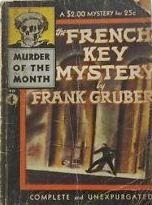Frank Gruber's The French Key Mystery: There's more than a mystery between those covers
At least as fascinating, however, is the supplementary matter in my edition of the novel, another fine purchase last week from the Bucks County Bookshop in Doylestown, Pa. And I don't mean just the cover's calling the book "A $2.00 Mystery for 25¢."
There are the exhortations to "brighten the lives of those who are giving their all" by sending them books and to buy U.S. war stamps and savings bonds because "It will cost money to defeat Germany, Italy and Japan."
The book's more straightforwardly commercial appeals have an earnestness that reads like innocence:
"MURDER OF THE MONTH titles are printed on good paper with bold, clear type and strongly bound with a decorative cover in full color, finished off with a hard, glossy surface. A further innovation are the unusual illustrations throughout each volume by world-famous artists, to add to your enjoyment whilst reading the story."They just don't write promotional copy like that anymore. Just try finding all this in a chain bookstore or on an e-reader.
© Peter Rozovsky 2014
Labels: bookstores, Bucks County Bookshop, Frank Gruber, miscellaneous, pulp






